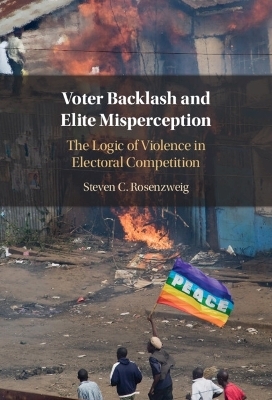
Voter Backlash and Elite Misperception
The Logic of Violence in Electoral Competition
Seiten
2023
Cambridge University Press (Verlag)
978-1-009-35488-2 (ISBN)
Cambridge University Press (Verlag)
978-1-009-35488-2 (ISBN)
This book investigates the causes and consequences of election-related violence, analyzing why politicians employ violence and how it affects their electoral prospects. It offers novel insight into election campaigns, democratic development, and the impact of violence on voters and provides new ideas to combat election-related violence.
Existing theories of election-related violence often assume that if elites instigate violence, they must benefit electorally from doing so. With a focus on Kenya, this book employs a wide array of data and empirical methods to demonstrate that - contrary to conventional wisdom - violence can be a costly strategy resulting in significant voter backlash. The book argues that politicians often fail to perceive these costs and thus employ violence as an electoral tactic even when its efficacy is doubtful. Election-related violence can therefore be explained not solely by the electoral benefits it provides, but by politicians' misperceptions about its effectiveness as an electoral tactic. The book also shows that violence in founding elections - the first elections held under a new multiparty regime - has long-lasting effects on politicians (mis)perceptions about its usefulness, explaining why some countries' elections suffer from recurrent bouts of violence while others do not.
Existing theories of election-related violence often assume that if elites instigate violence, they must benefit electorally from doing so. With a focus on Kenya, this book employs a wide array of data and empirical methods to demonstrate that - contrary to conventional wisdom - violence can be a costly strategy resulting in significant voter backlash. The book argues that politicians often fail to perceive these costs and thus employ violence as an electoral tactic even when its efficacy is doubtful. Election-related violence can therefore be explained not solely by the electoral benefits it provides, but by politicians' misperceptions about its effectiveness as an electoral tactic. The book also shows that violence in founding elections - the first elections held under a new multiparty regime - has long-lasting effects on politicians (mis)perceptions about its usefulness, explaining why some countries' elections suffer from recurrent bouts of violence while others do not.
Steven C. Rosenzweig is Assistant Professor in Political Science at Boston University. His research focuses on electoral violence and democratic accountability.
1. Introduction; 2. Election-Related Violence in Kenya and Around the World; 3. Theorizing Election-Related Violence: Toward a Theory of Elite Misperception; 4 Violence and Election Outcomes; 5. How Violence Affects Voting: Coercion, Persuasion, and Backlash; 6. Elite Misperception and Election-Related Violence; 7. Voter Backlash, Elite Misperception, and Violence Beyond Kenya; 8. Conclusion.
| Erscheinungsdatum | 25.05.2023 |
|---|---|
| Zusatzinfo | Worked examples or Exercises |
| Verlagsort | Cambridge |
| Sprache | englisch |
| Maße | 152 x 229 mm |
| Gewicht | 579 g |
| Themenwelt | Sozialwissenschaften ► Politik / Verwaltung ► Staat / Verwaltung |
| Sozialwissenschaften ► Politik / Verwaltung ► Vergleichende Politikwissenschaften | |
| Sozialwissenschaften ► Soziologie | |
| ISBN-10 | 1-009-35488-4 / 1009354884 |
| ISBN-13 | 978-1-009-35488-2 / 9781009354882 |
| Zustand | Neuware |
| Informationen gemäß Produktsicherheitsverordnung (GPSR) | |
| Haben Sie eine Frage zum Produkt? |
Mehr entdecken
aus dem Bereich
aus dem Bereich
Organisationen steuern, Strukturen schaffen, Prozesse gestalten
Buch | Softcover (2024)
Rehm Verlag
38,00 €


